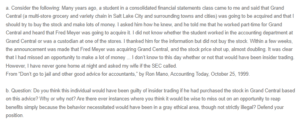Discussion – Insider Trading
Insider trading occurs when a person buys or sells securities acting on the price-sensitive information of a company in relation to the company’s securities.
The objective of insider trading is to avoid loss and to make a profit by taking advantage of such price-sensitive information only available to insiders and not to the public. Therefore, since the student was part of the officials who were preparing the financial statement, he could get access to the inside information of the business. People who could easily get involved in insider trading include directors of a company, employees of a company, and professionals attached to the company for example auditors, stockbrokers, and friends, and relatives of the persons operating in the company. Do you need urgent assignment help ? Get in touch with us at eminencepapers.com.
Insider trading is regulated by the Securities and Exchanges Commission and is only applied to public companies listed in the security exchange market and has no application to private companies unless they are subsidiaries of public companies.
Since the individual had a relationship with the student, an employee of the company, he would be guilty of insider trading which is a criminal offense under the Securities and Exchange Commission, and if found guilty, he would have been liable to a fine of $5000000 or a prison sentence of up to 20 years.
Therefore, it is wise to avoid involving in unethical behavior even when the activity in question falls in a gray area since the involvement could easily make one face the criminal Act and thereby lose all the gained profit and pay hefty fines or even face jail term as a result. Additionally, one would have to deal with the frustrations of being pressed with criminal charges for such dealing.
References
Klohn, & Lars. (2010). The European Insider Trading Regulation after Spector Photo Group.
Ventoruzzo, & Marco. (2015). Comparing Insider Trading in the United States and in the European Union: History and Recent Developments.
Wardrop, & Ann. (2o11). Not Ordinary Trading Companies: Common Law Responses to Insolvent Utilities in the United Kingdom, Australia.
ORDER A PLAGIARISM-FREE PAPER HERE
We’ll write everything from scratch
Question

Discussion – Insider Trading
a. Consider the following: Many years ago, a student in a consolidated financial statements class came to me and said that Grand Central (a multi-store grocery and variety chain in Salt Lake City and surrounding towns and cities) was going to be acquired and that I should try to buy the stock and make lots of money. I asked him how he knew, and he told me that he worked part-time for Grand Central and heard that Fred Meyer was going to acquire it. I did not know whether the student worked in the accounting department at Grand Central or was a custodian at one of the stores. I thanked him for the information but did not buy the stock. Within a few weeks, the announcement was made that Fred Meyer was acquiring Grand Central, and the stock price shot up, almost doubling. It was clear that I had missed an opportunity to make a lot of money … I don’t know to this day whether or not that would have been insider trading. However, I have never gone home at night and asked my wife if the SEC called.
From “Don’t go to jail and other good advice for accountants,” by Ron Mano, Accounting Today, October 25, 1999.
b. Question: Do you think this individual would have been guilty of insider trading if he had purchased the stock in Grand Central based on this advice? Why or why not? Are there ever instances where you think it would be wise to miss out on an opportunity to reap benefits simply because the behavior necessitated would have been in a gray ethical area, though not strictly illegal? Defend your position.

